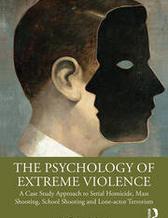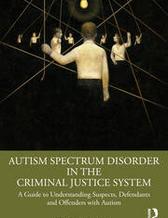
- Home
- Research
- Find research
- An interview with researcher Clare Allely
An interview with researcher Clare Allely
GNCs Clare Alley is the world's leading expert in mass shootings and extreme violence, in this interview she discusses her new books and research.
Please tell me a bit about yourself?

- I am a Professor of Forensic Psychology at the University of Salford in England. I received my PhD in Psychology from the University of Manchester and have previously graduated with an MA (hons.) in Psychology from the University of Glasgow, an MRes in Psychological Research Methods from the University of Strathclyde, an MSc in Forensic Psychology from Glasgow Caledonian University and a PgCAP from the University of Salford.
- I am one of the co-founders of the Autism and the Criminal Justice System hub at the University of Salford. The hub has adopted a ‘whole system’ approach, starting from prevention of entry into criminal justice system (CJS), exploring the individual's (with autism) experience from initial police involvement, arrest, custody, court proceedings, point of sentencing, prison, secure psychiatric care, point of release, probation and prevention from re-offending. As part of the hub, I regularly deliver training to clinicians, researchers, law enforcement and criminal justice professionals (e.g., barristers).
- I also act as an expert witness in both national and international criminal cases involving defendants with Autism Spectrum Disorder (ASD), Attention-Deficit/Hyperactivity Disorder (ADHD) and Fetal Alcohol Spectrum Disorder (FASD). My research in the field of neurodevelopmental disorders and offending has contributed to the evidence base used in the courts on psychology and legal issues. Some of my specialist areas for expert witness work include the following: autism and offending (e.g., indecent images or children or child sexual abuse images; terroristic behaviours; sexual offending; homicide; violence; cybercrime; arson and bestiality); issues or limitations with current standardised risk assessments (such as the HCR-20) for individuals with autism; important features to consider during police investigative interviews and court proceedings in suspects/defendants with autism and other neurodevelopmental disorders and, lastly, the impact of the prison environment on an individual with autism. I have been involved in nearly 35 cases to date (both nationally and internationally). As a researcher in the field of ASD and the criminal justice system as well as an expert witness in cases involving defendants with ASD, I see first-hand the importance of recognising and understanding the diagnosis of ASD in defendants in criminal cases.

- I am one of the team at the Fetal Alcohol Spectrum Disorder (FASD) at Salford Hub. We are the leading university on FASD globally. I work within a terrific team of researchers and practitioners led by Professor Penny Cook, Professor Raja Mukherjee, Dr Alan Price and David Gilbert. We research the following areas within the FASD Salford Hub: Assessing the Prevalence of FASD; Investigating the Impact of Prenatal Alcohol Exposure and Trauma on Child Development; Exploring the factors that predispose individuals with FASD to involvement with the Criminal Justice System and SPECIFIC: Salford Parents and carers Education Course for Improvements in FASD outcomes In Children.
What are you research interests?
- My research interests cover two key areas which overlap. First, exploring how certain features of autism spectrum disorder may provide the context of vulnerability to engaging in a wide range of offending behaviours including: lone-actor terrorism, extremism, indecent child imagery (possession, making or distribution), mass shootings, school shootings, sexual “hands-on” offending, cybercrime, stalking, violent behaviour, zoophilia and arson. I have also published in the field of autism spectrum disorder and the features of autism that may provide the context of vulnerability to being radicalised, engaging in extremist online material and engaging in terroristic behaviours. In this particular area I have found the work of Dr Zainab Al-Attar to be critical. I have also published research focused on autism in the courtroom, prison and secure care. For instance, I have co-authored a number of papers and chapters with Dr David Murphy, who is a Chartered Forensic and Consultant Clinical Neuropsychologist at Broadmoor Hospital, in the area of autism in secure care or police investigative interviewing. For instance, in a recently published book chapter, we provided a number of recommendations for criminal justice professionals when carrying out investigative interviews with autistic individuals, designed to improve both the experience for suspects and the outcomes. In the context of police investigation or custodial interview, some autistic individuals may not necessarily be recognised as immediately vulnerable by the police because of their apparent competent use of language and by virtue of the fact that they appear to be intellectually capable. However, despite their apparent abilities, many autistic individuals may experience considerable difficulties in being able to understand and cope with police demands, as well as high levels of distress in the custody context. Dr Murphy and I have also written about some of the ways in which individuals with an ASD might be better managed in high secure psychiatric care.
- My second research area of interest is in exploring the pathway to intended violence in the perpetrators of extreme acts of violence including lone-actor terrorism, school shooting, mass shooting and serial homicide. Over the last few years I have developed a particular research interest in threat assessment and measures of threat assessment such as The Terrorist Radicalization Assessment Protocol (TRAP-18) which consists of a collection of 18 behavior-based warning signs for terror incidents. I have published some papers on the retroactive application of the TRAP-18 to cases including the case of a lone wolf jihadist who carried out a fatal shooting at a joint Army-Navy recruiting center in Little Rock, Arkansas, on June 1, 2009.
- I am passionate about interdisciplinary studies. My research integrates knowledge from a broad range of disciplines including but not limited to: psychology, psychiatry, medicine, criminology, law, public health, criminal justice, criminology and social work.
You have written two fantastic books. Would you care to tell us a bit about each one?

- My first book was published by Routledge in 2020. It is called The Psychology of Extreme Violence: A Case Study Approach to Serial Homicide, Mass Shooting, School Shooting and Lone-actor Terrorism”. The book features a unique overview of the different forms of extreme violence and considers the psychology of extreme violence alongside a variety of contributing factors, such as brain abnormalities in homicide offenders. Featuring several contemporary real-world case studies, this book offers insight into the psychology of serial homicide offenders, mass shooters, school shooters and lone-actor terrorists. The main purpose of this book is not to glorify or condemn the actions of these individuals, but to attempt to explain the motivations and circumstances that inspire such acts of extreme violence. By adopting a detailed case study approach, it aims to increase our understanding of the specific motivations and psychological factors underlying extreme violence.

- My second book , “Autism Spectrum Disorder in the Criminal Justice System: A Guide to Understanding Suspects, Defendants and Offenders with Autism” was published last year by Routledge. This book focuses on autism spectrum disorder (ASD) in the criminal justice system. It is important to note here that rather than being the perpetrators of offending behaviour, individuals with ASD are more likely to be the victims of crime. However, there is nevertheless a small proportion (a small subset) of individuals with ASD who do offend and statistically it tends to be certain types of offending such as sexual offending, arson, computer offences, stalking and violent offences. Given this, it is therefore vital that there is an increased understanding and awareness of how certain features of ASD may provide the context of vulnerability to engaging in offending behaviours. This book provides an in-depth understanding of how certain features of ASD may provide the context of vulnerability to engaging in a number of types of offending behaviours. Different chapters in the book focus on arson or fire-setting; cybercrime (e.g., hacking); online sexual offending such as the viewing of indecent child imagery; offline sexual offending; violent crime; stalking; terroristic behaviour (including radicalisation and extremism); bestiality or zoophilia; and also extreme violence such as mass shooting and serial homicide. This book also outlines the ways in which a defendant with ASD may present in court and how they may exhibit behaviour which could be misinterpreted and perceived negatively, leading to an unfair trial. Lastly, it discusses the need to identify the impact that ASD can have on the capacity to form the requisite criminal intent and offers appropriate court adaptations to support individuals with ASD during court proceedings.
- Last year, I was delighted to be invited by Michelle Clarke (Barrister) to deliver a presentation about my second book on autism and the criminal justice system at her law firm – Church Court Chambers in London. Church Court Chambers also kindly organised and hosted a book launch for my second book (https://churchcourtchambers.co.uk/).
Who are the books intended for?
- My first book (“The Psychology of Extreme Violence: A Case Study Approach to Serial Homicide, Mass Shooting, School Shooting and Lone-actor Terrorism”) uses nontechnical language. It is an ideal companion for students, researchers, and forensic practitioners interested in the multidisciplinary nature of extreme violence. This book will also be of interest to students taking courses on homicide, mass shooting, school shooting, terrorism, forensic psychology and criminology and criminal justice. My second book (“Autism Spectrum Disorder in the Criminal Justice System: A Guide to Understanding Suspects, Defendants and Offenders with Autism”) is ideal for criminal defence lawyers and practitioners in psychology, psychiatry, and social work as well as policy makers and reformers. This book will also be of interest to students taking courses on criminology, social policy, psychology, criminal justice, law and psychiatry and sociology.
I think it is important that there is more in-depth awareness and understanding of the ways in which a defendant with ASD may present in court. Many individuals with ASD can exhibit behaviour (which can be perceived as being odd, bizarre or inappropriate) during court proceedings which could be misinterpreted and perceived negatively.
You have just published a paper on Autism Spectrum Disorder and personality diagnoses. Could you tell us a bit about this paper and its findings?

- In our paper, we were interested in the overlap between personality disorders (PDs) and ASD and how clinicians carry out a differential diagnosis. The overlap between PDs and ASD is most evident in the realms of social communication and interaction. For example, both involve difficulties in developing and maintaining relationships and result in impairment across several domains of functioning (such as occupation, intimate relationships, friendships). Research has found that the symptomatic overlap of ASD and PDs can result in differential diagnostic uncertainty most notably in women. Clinical observations have indicated a number of similarities between ASD and borderline personality disorder (BPD) including identity problems, intense anger, self-damaging behaviour, and severe problems in interpersonal relationships. It is also recognized that BPD can mask autistic features but may also present as a comorbidity, which can lead to misdiagnosis. We highlight in our paper the published guidelines for clinicians to help then differentiate between ASD and BPD (Gordon, Lewis, Knight, & Salter, 2020). The guidelines are definitely a step forward. However, the authors note that they developed the guidelines based on the available theoretical literature and the authors’ experience in clinical practice rather than any empirical evidence. It is also important to stress that there is relatively little theoretical literature currently available. To our knowledge, there has been no empirical studies to date which have explored the inadequacies of current diagnostic/screening measures in differentiating between people with ASD and PD. This is an area that urgently needs further research. [
What are you currently working on now?

- I am working on a number of papers relating to the pathway to intended violence in mass shooters and lone-actor terrorists. I am also working on some papers and grant applications regarding ASD in the courtroom. I think it is important that there is more in-depth awareness and understanding of the ways in which a defendant with ASD may present in court. Many individuals with ASD can exhibit behaviour (which can be perceived as being odd, bizarre or inappropriate) during court proceedings which could be misinterpreted and perceived negatively. It can lead to the court (jurors and judge) to consider the defendant as being cold, remorseless and guilty. Expert testimony may therefore be necessary in order to educate the court as to why the defendant may be presenting in the way that they are with the ultimate aim of ensuring they receive a fair trial.
3 interesting facts about yourself
1. I was involved as an expert in the case of Alan Hall in New Zealand and I have since presented on the contributory role of an autistic presentation to miscarriage of justice in this case. It was the first case I ever worked on as an expert witness. The case of Alan Hall has been described as one of New Zealand's worst miscarriages of justice. Mr Hall was wrongfully convicted of a 1985 murder and imprisoned for 19 years. The Supreme Court in New Zealand this year overturned the conviction after the Crown admitted there had been a miscarriage of justice. When Mr Hall was arrested, police subjected him to lengthy interrogations, on one occasion for eight hours, and another for 15 hours, without a lawyer or support person present. He provided a number of different answers about no longer having the bayonet and his beanie in his possession. His differing explanations were considered as evidence of guilt. It was not until 2019, 34 years after the murder, while he was still in prison, that Mr Hall was formally diagnosed with autism. Due to his condition, I highlighted in my expert report concerns about Mr Hall's ability to cope with the type of questions, the length of the interviews, and about his ability to appropriately respond. Mr Hall’s lawyer said the police and prosecution exploited his vulnerability and subjected him to an oppressive and unfair interrogation. When Chief Justice, Helen Winkelmann announced the Court's decision to acquit Mr Hall, she acknowledged that there had been a substantial miscarriage of justice "either from extreme incompetence, or a deliberate strategy to achieve a conviction".
2. In 2017 I was awarded the prestigious 2016 First Place Winner of the Henry Stonnington Award for Review Articles, sponsored by Taylor and Francis. The review which received this award is entitled “Prevalence and assessment of traumatic brain injury in prison inmates: A systematic PRISMA review” and was published in the journal ‘Brain Injury’. Annual awards are given for the best Review Articles published in the journal Brain Injury. This is an achievement I am extremely proud of.
3. I was invited last year to deliver my first keynote presentation at a conference. It was the British Psychological Society’s (BPS) Division of Forensic Psychology Annual conference. I presented on important considerations and recommendations regarding defendants with autism spectrum disorder in criminal court.
Blog entries by Clare Allely
- Urgent Need for an Autism Screening Tool which is not Male-Biased (blog)
- Lone Wolf Terrorism: Vulnerabilities and Risks in Autism (blog)
- Sexual Offending Behaviours: Urgent Need for ‘Autism Sensitive Risk Assessment Guide (blog)
- The role of autism symptomatology in certain specific child pornography offences (blog)
- Trauma in Autism Spectrum Disorders (blog)
- The relationship between Cyber-Dependent Crime and ASD needs further investigation (blog)
- Fire-setting and Arson in Individuals with Autism Spectrum Disorder (blog)
- Defendants with Autism Spectrum Disorder in the Courtroom: Considerations and Implications (blog)
Clare in the news
-
Study: ‘Significant’ statistical link between mass murder and autism, brain injury (The Washington Post)
Articles by Clare
-
Britain’s criminal justice system doesn’t know what to do about autism (The Conversation)
-
Why we can’t ignore the silent epidemic of traumatic brain injury in prisons (The Conversation)
-
Are autistic people at greater risk of being radicalised? (The Conversation)
-
Can we predict who will become mass shooters? (The Conversation)
-
How to help vulnerable dads be better fathers (The Conversation)
-
Deadly combination: the psychiatric disorders that might have made Anders Breivik into a mass shooter (The Conversation)
